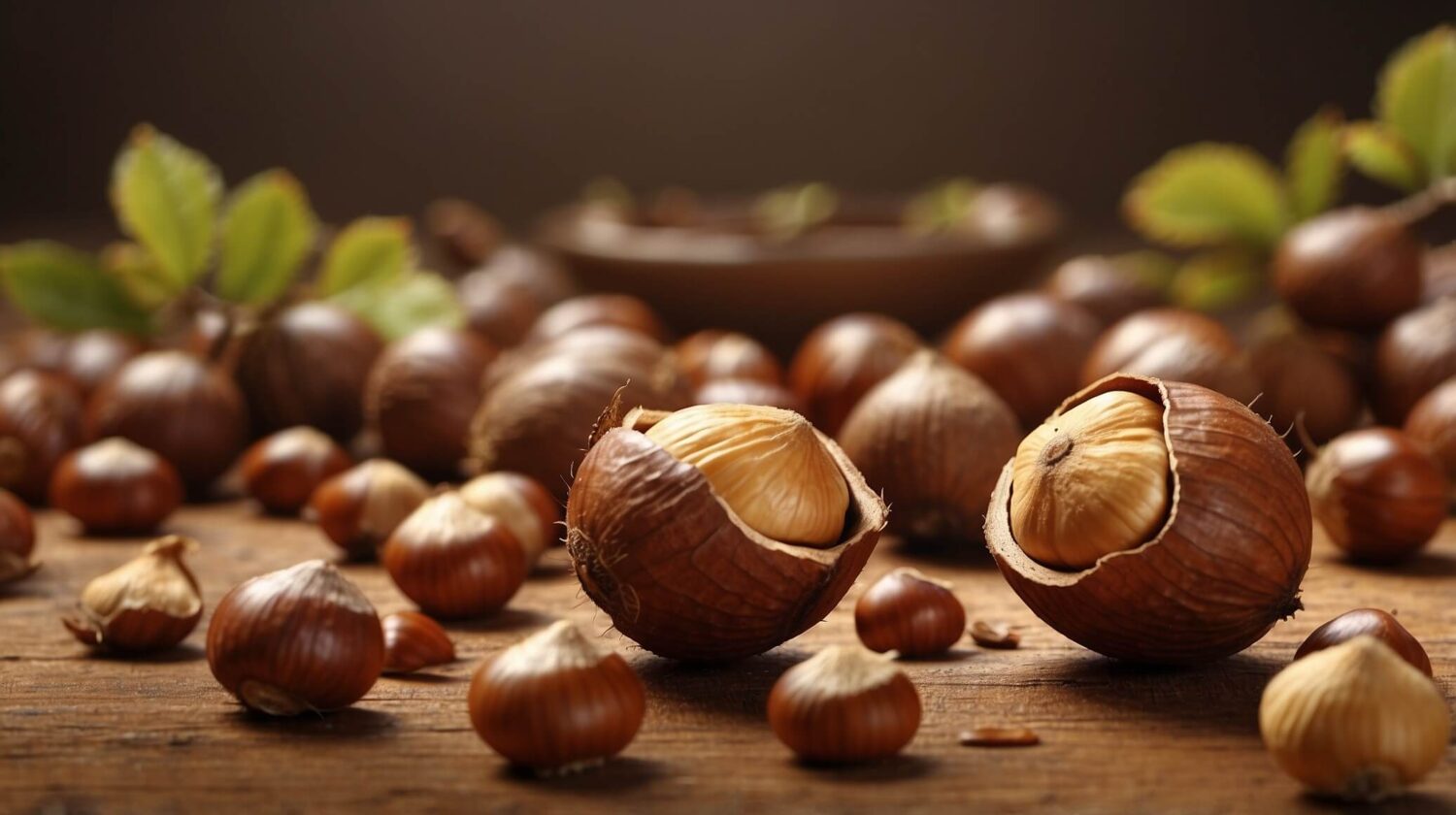If you’ve ever munched on a delicious chocolate hazelnut spread or enjoyed a handful of roasted hazelnuts, you might be wondering, **what are hazelnuts good for?** It’s not just their rich, nutty flavor that keeps us coming back for more. In fact, hazelnuts bring along an impressive lineup of health benefits and nutritional value that make them a worthy addition to our diets. Let’s dive a bit deeper into the delightful world of hazelnuts!
Hazelnuts Nutrition: What Makes Them So Special?
First off, let’s talk about what’s packed inside those tiny, round morsels. According to the United States Department of Agriculture (USDA), a one-ounce serving of hazelnuts offers about 178 calories. But calories aren’t the only thing you should be looking at—the nutrition here is pretty astounding.
Rich in Healthy Fats
Approximately 76% of the calories in hazelnuts come from fats, most of which are heart-healthy monounsaturated fats. Research suggests that these healthy fats promote a better cholesterol profile. In fact, studies linked a diet rich in monounsaturated fats with a reduced risk of heart disease. You can read more about this in a study published in the *Journal of the American Heart Association* here.
Loaded With Antioxidants
Next up, antioxidants! Hazelnuts are especially high in vitamin E, a powerful antioxidant that helps protect your cells against damage caused by free radicals. According to a study published in 2020, maintaining high levels of vitamin E may be linked to less cognitive decline as we age. Who doesn’t want that? A handful of hazelnuts could be an easy step towards better brain health. Plus, they also contain other antioxidants like flavonoids and phenolic acids, which add to their health benefits.

Good Source of Fiber
Fiber is one of those unsung heroes when it comes to nutrition. Hazelnuts provide about 2.7 grams of fiber per ounce, which isn’t a massive number, but it certainly contributes to your daily intake. This fiber aids digestion and can help you feel full longer. A fiber-rich diet may also lower your risk of developing certain diseases, including colorectal cancers, as stated by the American Institute for Cancer Research here.
Vitamins and Minerals
Hazelnuts are no slouch in the vitamins and minerals department, either. They’re high in several key nutrients: magnesium, copper, manganese, and thiamine, just to name a few. For example, magnesium is vital for over 300 enzymatic reactions in the body and is crucial for muscle and nerve function. Given how much we rely on our bodies, that’s pretty important!
Health Benefits of Hazelnuts: What Are Hazelnuts Good For?
After breaking down the nutrition, let’s talk about what those nutrients can actually do for you. You might be surprised by the extensive list of health benefits that hazelnuts provide!
Heart Health Benefits
As mentioned earlier, the high amounts of monounsaturated fats, fiber, and antioxidants make hazelnuts a boon for heart health. Eating nuts regularly has been associated with a lower risk of heart disease. Specifically, a 2015 meta-analysis found that consuming nuts—like hazelnuts—was linked to a 30% reduced risk of coronary heart disease. It’s a pretty compelling argument for snacking on these little nuggets!
Weight Management
Believe it or not, hazelnuts can help in weight management as well. While nuts are calorie-dense, their fiber and protein content can help keep us feeling full, preventing unnecessary overeating. An intriguing study from 2019 suggested that including nuts in a low-fat diet may actually help maintain weight loss better than a nut-free diet. So, they might just be the ally you need on your weight management journey!

Reduced Inflammation
Inflammation is often a sneaky underlying cause for many chronic diseases. Luckily, hazelnuts have anti-inflammatory properties due to their high content of antioxidants. A study from 2014 demonstrated that regularly consuming hazelnuts may reduce inflammation levels. If you’re like me and are prone to pesky little inflammation issues, incorporating more hazelnuts could potentially make a difference!
Bone Health
You might not automatically think of nuts when it comes to bone health, but hazelnuts can actually help you maintain strong bones! The minerals they provide—like magnesium and manganese—are essential for bone formation and density. By ensuring you get enough of these nutrients, you can help protect yourself from osteoporosis later in life.
Brain Function
We’ve already touched on vitamin E and cognitive function, but let’s elaborate further. Research indicates that antioxidants may also play a role in reducing the risk of neurodegenerative diseases, like Alzheimer’s. Plus, hazelnuts provide healthy fats that ensure proper brain function. It’s often said; you are what you eat—so, why not eat hazelnuts for a sharper brain?
Skin Health

Don’t underestimate the effects of hazelnuts on your skin. The vitamin E content plays a significant role in skin health. It can help protect your skin from sun damage and keep it hydrated. Honestly, I’ve noticed a difference in my skin’s texture since I started eating hazelnuts regularly—definitely worth a try!
Culinary Uses: Endless Possibilities!
While we’ve chatted a lot about nutrients and health benefits, let’s not forget about the versatility of hazelnuts in the kitchen. They can be enjoyed in sweet or savory dishes, making them incredibly adaptable.
#### Snacking and Munching
On lazy weekends, nothing beats a handful of roasted hazelnuts as a quick snack. They are crunchy, rich, and practically beg for a cozy movie date at home.
#### Fruit and Nut Salads
Chop them up and toss them in your fruit salad for that delightful crunch. I make a habit of preparing a fruity salad with hazelnuts, arugula, and a light vinaigrette, and trust me—it’s a game changer!
#### Baking and Cooking
From chocolate chip cookies to truffles, hazelnuts can elevate your dessert game. Recently, I made brownies with crushed hazelnuts on top, and let me tell you, they turned out amazing!
Hazelnut Butter and Spreads
Who can resist thought of spreading hazelnut butter on toast? Seriously, it’s a winner! Packed with energy and flavor, this spread pairs wonderfully with fruits or even drizzled over pancakes.
Hazelnut Milk
For those opting for dairy-free alternatives, hazelnut milk has hit the shelves like a superstar! I tried it in my morning coffee, and wow, it added a unique flavor. Plus, it’s usually lower in calories compared to creamy whole milk.
Amazing Dessert Options
So is Nutella your thing? How about a homemade chocolate hazelnut tart? Honestly, it takes some time, but it’s well worth the effort on special occasions. Just looking at that flaky crust with hazelnut ganache makes my heart flutter!
A Word of Caution
Despite all this love for hazelnuts, please keep in mind that they are still nut allergens for some folks. If you or someone in your household has nut allergies, make sure to stay away from hazelnuts.
Final Thoughts: The Hazelnut Benefits Are Worth It!
In wrapping up, I hope it’s clear why people are buzzing about hazelnuts! These little nuts pack a punch when it comes to nutrition and health benefits. By answering the question, **what are hazelnuts good for,** we’ve explored everything from heart health to brain function. Plus, they fit easily into various meals and snacks, making them incredibly versatile. Next time you’re in the grocery store, consider picking up a bag of hazelnuts—you might just fall in love, like I did!
So, folks, what are you waiting for? Grab a handful of hazelnuts, get creative in the kitchen, and take steps toward better health! Trust me, your taste buds and your body will thank you.
References:
– United States Department of Agriculture
– Journal of the American Heart Association
– American Institute for Cancer Research
Happy snacking!
